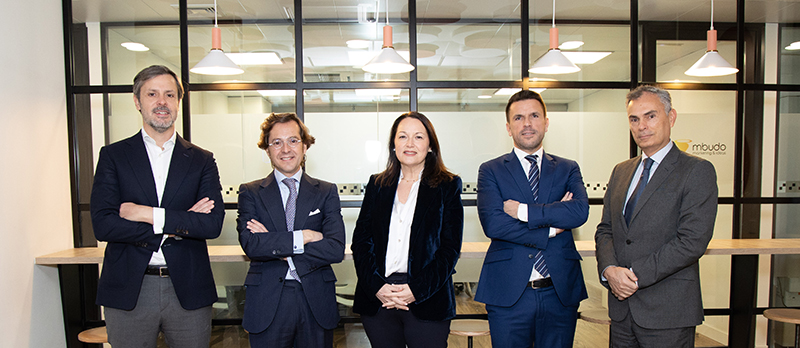
Aurora Cuadros, Corporate Director of Securities Services at Cecabank, participated in the 1st Depositary Roundtable, organised by FundsPeople, to discuss the main strategies that depositaries will pursue in 2025.
The year 2025 has kicked off with many unresolved issues. On the one hand, depositaries have had to adapt to multiple regulations that have just been introduced, which will be implemented in the coming months. In addition to this, the products that fund managers are promoting have evolved and, consequently, so have the services that they offer.
These include Luxembourg, where Cecabank is finalising its new operational branch in the field of Securities Services. From there it will provide depositary services for the vehicles domiciled there, as well as custody and settlement of securities, reinforcing its commitment to supporting its customers. 'Luxembourg is home to more funds than any other European country and is the world leader in cross-border fund distribution. Therefore, we are faced with a business opportunity, not only for Spanish customers, but also for local customers. With regard to Portugal, where we established a branch in 2018, we will continue to expand our presence', said Aurora Cuadros, Corporate Director of Securities Services at Cecabank, during the 1st Depositary Roundtable organised by FundsPeople.
Alejandro de los Ojos, Director of Sales and Customer Relations at CACEIS, agreed: 'It seemed that the flow of fund managers to Luxembourg had stopped, but this is not the case. We are participating in several interesting large projects thanks to our significant presence in the country', he stated.
Inversis also ventured into the Grand Duchy last year, with the purchase of Banque Havilland's institutional depositary business in Luxembourg and the subsequent application to open a branch there. In addition, it had already taken a 40% stake in Adepa in 2022 and last year closed a deal with Euroclear, which will soon take a 49% stake in Inversis (subject to regulatory approval), to accelerate the company's domestic and international growth. 'Our customers demand more comprehensive and customised solutions. We have been working for years on a strategy to provide a 360º service, both in Spain and Luxembourg. Including marketing, depositary, management and administration services through Adepa, as well as the fund platform. This will allow us to offer a differential value proposition for national and international customers', insisted Óscar Pino, head of Depositary Services at Inversis.
Securities Services BNP Paribas has been present in Luxembourg for 30 years. 'Our positioning continues to be to support our customers in their internationalisation, both in UCITS and especially in AIF. In this regard, we offer value-added services, both banking and back-office reporting and digital solutions for fund managers and their investors', said Felipe Guirado, Head of Sales for Spain and Portugal, Securities Services, BNP Paribas.
In line with this, another service that customers are demanding is direct access to clearing houses. 'We are already a direct member of Eurex in derivatives settlement, and in Portugal we are going to be a direct member of Interbolsa', recounted Aurora Cuadros. BBVA will also focus on custodian services to non-resident customers. 'It is a key line of business', said Fernando García Rojo, Head of Sales at BBVA Global Securities Services. Essentially, in the Iberclear direct account operator models for international banks.
On the depositary side, BBVA will reinforce electronic banking tools for those customers with whom it does not interact via the SWIFT system. Fernando García Rojo also mentioned the importance of Corporate Action and tax recovery services as key to its value proposition. 'There are multiple regulations in each country that make it very difficult to standardise processing', he suggested. Aurora Cuadros agreed with this view, pointing out: 'We are asked by fund managers to help them out in this area, which is why we provide optimisation of tax refund flows. This requires considerable individual expertise with regard to each specific jurisdiction. It is not enough to recover double taxation, rather it is necessary to go even further through administrative channels, including through the Court of Justice of the European Union (CJEU)'.
This has been one of the industry's biggest demands for years. In other words, to allow Collective Investment Institutions (CIIs) -this is only envisaged for investment funds and SICAVs- to lend the shares in their portfolios to third parties and thus obtain an additional return on their portfolios. With the end of the public hearing period, it is closer to becoming a reality. 'Securities lending should be the most innovative product for investment funds this year', noted Felipe Guirado.
The expert noted that many corporate transactions are being completed in the sector. 'Entities seek to complement their businesses: those with distribution capacity seek management and vice versa. They need to group together different entities, and we help them with this by offering a single operating model that allows them to integrate these new companies', he explained. They also provide them with sustainability solutions, which has made board voting increasingly important in recent years.
One sector where they continue to see a great deal of interest is in the venture capital fund depositary sector. In this regard, Fernando García Rojo commented that, although it seemed that its growth could slow down, it continues. 'It was closely linked to a low interest rate scenario, now with higher rates there are still a lot of fund managers setting up new vehicles. Moreover, each fund manager and fund are unique. This is why we always talk about flexibility and supporting our customers. On the private equity side, the figure of the depositary was not as well known, and it is essential that they see us as an ally who is there to support, help and safeguard the rights of shareholders', he stressed.
In particular, within the entire range of vehicles, Felipe Guirado sees 'an incipient appetite for semi-liquid products'. A trend that is more prevalent in Europe. This type of vehicle, continued the expert, 'can be seen above all in the offers of international fund managers; however, we need to see how it adapts to Spanish regulations'.
In recent years there has also been a significant transfer of funds to target return or guaranteed funds. In this regard, Alejandro de los Ojos pointed out that 'the big question is until when are they going to be promoted and how is the money that is in these products going to accrue to other types of funds. While we see this trend continuing, supported by a still attractive short-term interest rate scenario, we will have to closely monitor the impact that central banks' monetary policies may have on this type of products'.
Another area in which all institutions are placing an emphasis is on offering crypto-asset services. The European Union's Markets in Crypto-Assets Regulation (MICA) has been in force since 1 January and they are all working to be able to offer these services. It is a further step towards establishing a regulatory framework for the cryptocurrency universe, a type of asset class that has become very popular in recent years but until now lacked legal certainty.
